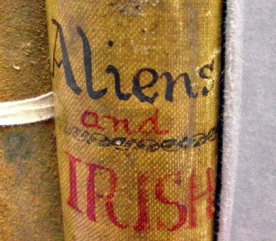'Aliens and Irish': Reading's role in the 1916 Easter Rising
Release Date 23 April 2013

As armed separatists attempt to overthrow what they see as a tyrannical, warmongering government, those who support the rebels are arrested and jailed without trial. Not Syria, Afghanistan or North Korea - but Reading less than 100 years ago.
Now members of the public have a chance to find out for themselves how Reading was involved in the fallout from the failed 1916 Easter Rising in Dublin, with a special event planned later this month to highlight how the town's notorious jail was used to imprison Irish dissidents in the wake of the rebellion.
‘Enemies of the State' launches with a free event at the Berkshire Record Office on April 30 aimed at anyone interested in politics, freedom, and balancing civil liberties with law and order - or simply anyone who wants to know more about Reading's role at a pivotal moment in British and Irish history.
"No matter what your background, this is a fascinating subject," said Professor Peter Stoneley, professor of English at the University of Reading and the project's principal investigator.
"This project delves into an under-explored corner of Reading's past that has strong relevance to our contemporary landscape. We believe this event will appeal to anyone interested in civil liberties, as well as to those who have an enthusiasm for history."
‘Enemies of the State: The Easter Rising and Irish Detainees in Reading Prison' is a research project run by the University of Reading, in partnership with the Berkshire Record Office, and funded by the Arts and Humanities Research Council (AHRC).
The project, which began in February, has been uncovering documents held in Berkshire's official archives that shed light on the British government's policy of internment (imprisonment without trial) and has revealed fascinating details of the individuals who were brought to Reading because of their activities as Irish dissidents.
Among the 37 republicans interned at Reading was the future President of the Irish Republic, Arthur Griffiths, as well as noted playwright and novelist, Terence Macswiney.
Researcher Dr Cleo Hanaway said: "As our project and exhibition will show, the infamous ‘Reading Gaol' was not only the enforced home of Oscar Wilde in the 1890s - a few years later it was the ‘H-Blocks' prison of its day.
"Some of the smallest details are the most illuminating. For example, Reading prison was used during World War I for the internment of foreign political prisoners from Germany and elsewhere, and Irish republicans - described in the official record book as ‘Aliens and Irish'."
The launch event takes place at 6pm on Tuesday 30 April at the Berkshire Record Office, Coley Avenue, Reading. Project leaders and guest speakers will discuss the issues from 6.30pm. Refreshments and entertainment will be provided with music from the era.
Places at the launch event are free but limited - contact Cleo Hanaway by email c.a.hanaway@reading.ac.uk or call 0118 378 7371 to book or for more details. The exhibition at the record office will then run until July.
ENDS
For more information for media, or to organise interviews, contact Pete Castle at the University of Reading press office on 0118 378 7391 or p.castle@reading.ac.uk.
Notes to editors:
More on the Enemies of the State project is available on the project blog.
